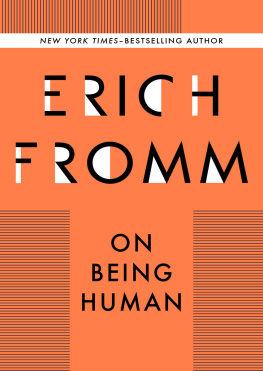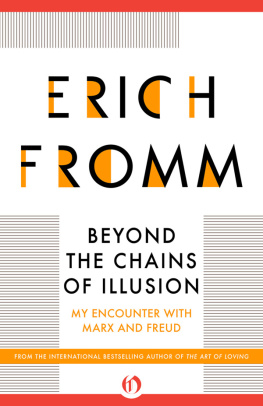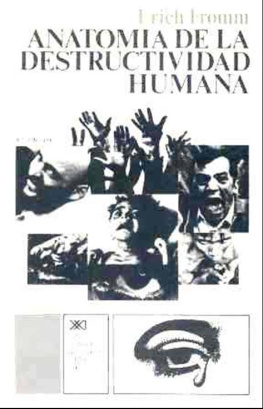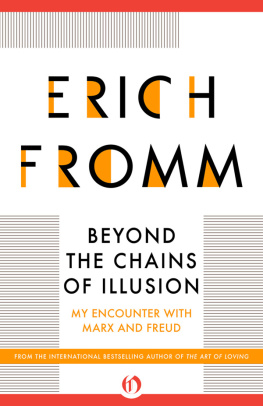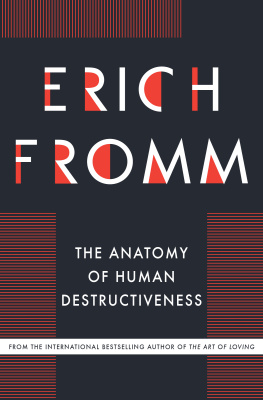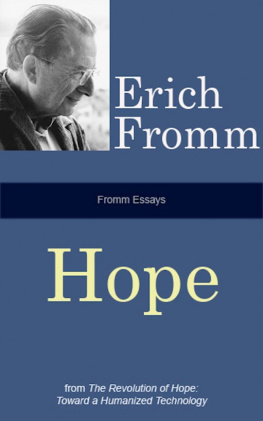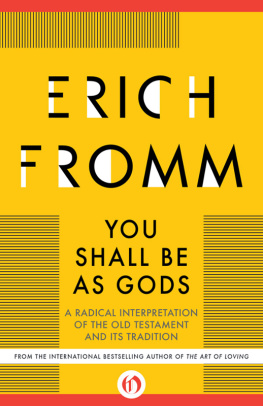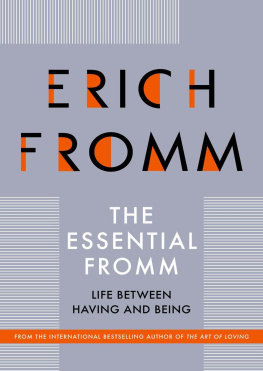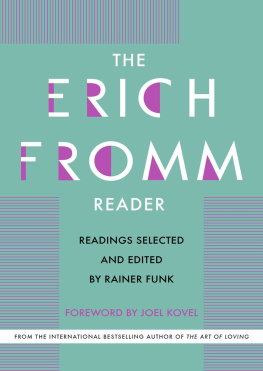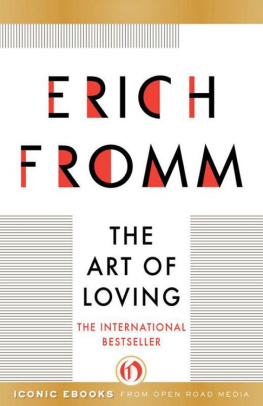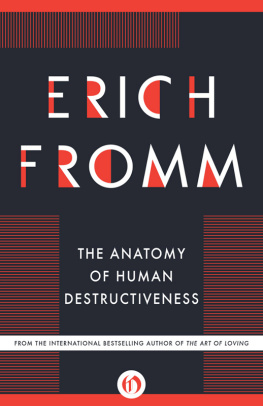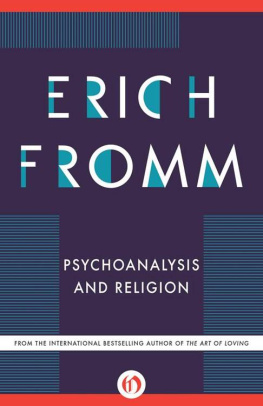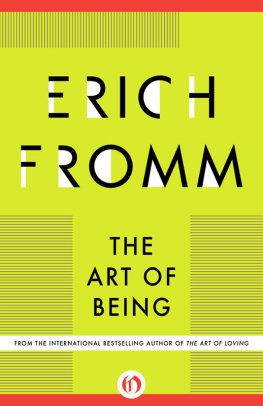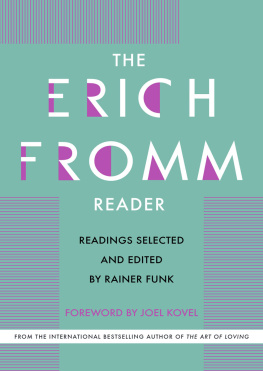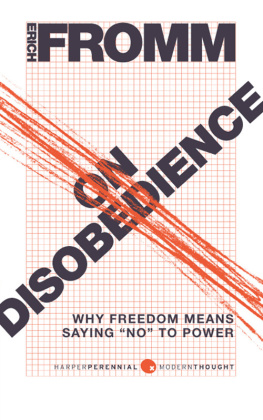Erich Fromm - On Being Human
Here you can read online Erich Fromm - On Being Human full text of the book (entire story) in english for free. Download pdf and epub, get meaning, cover and reviews about this ebook. City: New York, year: 1991, publisher: Open Road Integrated Media, genre: Politics. Description of the work, (preface) as well as reviews are available. Best literature library LitArk.com created for fans of good reading and offers a wide selection of genres:
Romance novel
Science fiction
Adventure
Detective
Science
History
Home and family
Prose
Art
Politics
Computer
Non-fiction
Religion
Business
Children
Humor
Choose a favorite category and find really read worthwhile books. Enjoy immersion in the world of imagination, feel the emotions of the characters or learn something new for yourself, make an fascinating discovery.
- Book:On Being Human
- Author:
- Publisher:Open Road Integrated Media
- Genre:
- Year:1991
- City:New York
- Rating:5 / 5
- Favourites:Add to favourites
- Your mark:
- 100
- 1
- 2
- 3
- 4
- 5
On Being Human: summary, description and annotation
We offer to read an annotation, description, summary or preface (depends on what the author of the book "On Being Human" wrote himself). If you haven't found the necessary information about the book — write in the comments, we will try to find it.
On Being Human — read online for free the complete book (whole text) full work
Below is the text of the book, divided by pages. System saving the place of the last page read, allows you to conveniently read the book "On Being Human" online for free, without having to search again every time where you left off. Put a bookmark, and you can go to the page where you finished reading at any time.
Font size:
Interval:
Bookmark:


WHOEVER ATTEMPTS TO IDENTIFY the scarlet thread that runs through the entire corpus of Fromms writings will, first of all, discover the socio-psychological approach by which he searched for mans socially molded passionate strivings. Yet, no later than the late 1930s, in conjunction with his departure from the Institute for Social Research and his disputes with Horkheimer, Marcuse, and Adorno, something different and unmistakably Frommian becomes noticeable and runs through his life and work like a scarlet thread: his humanistic view of man and the world. Whenever Fromm wants, from this point on to characterize even his own thought, he uses the attribute humanistic. He speaks of a humanistic science of man, of humanistic socialism, of humanistic industrial society, of humanistic conscientiousness, of humanistic religion, of humanistic management, of a humanistic view of the world, of humanistic psychoanalysis, of humanistic character, of humanistic ethics, and of humanistic utopia.
In evaluating Fromms thought, it is often exactly this humanistic belief in man that leads to a parting of the minds: How can Fromm, who has recognized the deleterious effects of mans self-alienation with such clarity, and who has explained them in terms of our cultures socio-economic relationshipsand yet has simultaneously unmasked any salvation from without as merely an expression of self-alienationhow can Fromm nevertheless believe in man?
The texts of this volume from Fromms unpublished writings answer this question in a twofold manner: They show the entire extent of the destructive and terrible self-alienation of todays man, and yet simultaneously they speak of the real possibilities that can lead to mans becoming happy. There is a real utopia as long as man has at least partial access to his own powers that promote growth.
The departure point of Fromms humanism, made possible by the insights of psychoanalysis, is that the unconscious represents the entire personand all of humanity. The unconscious contains the entire spectrum of possible answers, and it very much matters which possibilities are cultivated and which are hindered and repressed. Fundamentally, though, man, in any culture, is faced by a gamut of possibilities: He is the archaic man, the beast of prey, the cannibal, the idolater; but he is also the being with the capacity for reason, for love, for justice. Since man does not exist except as a social being, the particular type of society in which he lives determines which possibilities are favored. Every society shapes the energies of people in such a way that they want to do what they must do in order for society to function. Social necessities become transformed into personal needs, into the social character. (Ibid., pp. 75-76.)
Yet every society does not only promote certain possibilities that are at the disposal of humans unconscious, insofar as society makes these possibilities known and the individual identifies with them. Possibilities and tendencies that contradict social patterns of behaviorthe character of societyare quelled and repressed. That is why our conscious mind represents mainly our own society and culture, while our unconscious represents the universal man in each of us.
In his unconscious, man experiences all humanity and himself as saint and sinner, child and adult, sane and insane, man as he was in the past and man as he will be in the future. (Ibid.) This condition is why humanism has its ultimate justification in humanistic experience, that is, in the humanizing and productive effect of making conscious that which is unconscious. Writes Fromm:
This humanistic experience consists in the feeling that nothing human is alien to one, that I am you, that one can understand another human being because both of us share as our common possession the same elements of human existence. The broadening of self-awareness that humanistic experience brings aboutincluding as it does the transcending of consciousness and the revelation of the sphere of the social unconsciousenables man to experience himself in the full dimensions of his shared humanity. (Ibid.)
Thus, with the knowledge that the unconscious, independent of that which is socially conscious and repressed, represents the entire person with all his possibilities, Fromm justifies the humanistic belief in the unity of people not only theoretically; as soon as one opens oneself to ones unconscious, becomes conscious of ones unconscious and thus comes to experience ones other possibilities, one then unfurls, grows, and has the paradoxical and productiveor, as Fromm also says, the humanisticexperience that one can be related reasonably and lovingly to the world and to people because nothing foreign is any longer really strange to one. Only in opening oneself up to the unconscious, to the entire person in oneself, in the realization of ones individuality, does a person come to the experience of the universal human, for only the fully developed individual self can abandon the ego.
What interests Fromm most about humanism, what leads him to use the attribute humanistic so often, and why he advocates a renaissance of humanism has to do with this humanistic experience. He is concerned with what is humanistic in the sense of the development of mans own loving and reasonable powers, as well as with a humanistic orientation and attitude (as he made clear within his characterology) by his concept of productivity and of productive orientation, of biophilia and the mode of being. As a person experiences himself more and more as author, actor, and subject of his lifeand is thus himself who thinks, feels, and acts with his own forceshe also develops his forces of reason and love, with which he can be entirely with the world and other persons without losing himself.
The individual texts of this volume were composed during the last twenty years of Fromms life. These texts were characterized as much by the insight into the entire extent of humans self-alienation as by a faith, unbroken to the very end, in man. They are based on lectures (especially Part I) and manuscripts that Fromm formulated for specific occasions (especially Part II, which contains humanistic initiatives and declarations) or that he wrote as book manuscripts (such as the concluding Part III, concerning the real utopia of the being mode of existence, according to Meister Eckhart and Karl Marx).
The editor has provided the grouping, coordination, and division of the texts, as well as most of their titles. Editorial notes concerning the origin of the individual manuscripts appear in cursive script and precede the texts. As in all unpublished writings, several omissions and additions are made easily recognizable by brackets.
Tbingen, 1993
Rainer Funk
(Translated by Lance W. Garner)
E. Fromm, Humanism and Psychoanalysis, in Contemporary Psychoanalysis, Vol. l (1964), p. 27.
E. Fromm, The Heart of Man: In Genius for Good and Evil, New York, 1964, p.93.
E. Fromm, Beyond the Chains of Illusion: My Encounter with Marx and Freud, New, York, 1962, p.178.
From September 6 through 11, 1961, an International Congress for Psychoanalysis and Its Continued Development took place in Dsseldorf, West Germany. Aside from Fromm, participants included a group of non-orthodox psychoanalysts from Germany (W. Schwidder, F. Heigl, and F. Riemann of the German Psychoanalytical Society, to name only three), the Netherlands (A. J. Westerman Holstijn), Switzerland (H. Binswanger and M. Boss of Dasein Analysis), and the United States (G. Chrzanowski and H. Stierlin). On September 6, before these same 300 non-orthodox psychoanalyses, Fromm presented a lecture (published in his German Gesamtausgabe, 1966b) on the Fundamental Positions of Psychoanalysis. A second, public lecture by Fromm took place on September 9. Its title was Modern Man and His Future. This lecture contained a condensed version of Fromms diagnose of the age at the beginning of the 1960s, before he had developed the concept of necrophilia. The present text, published here for the first time in English, is a transcription of a tape of that lecture. Fromm delivered the lecture largely without the use of a manuscript.
Next pageFont size:
Interval:
Bookmark:
Similar books «On Being Human»
Look at similar books to On Being Human. We have selected literature similar in name and meaning in the hope of providing readers with more options to find new, interesting, not yet read works.
Discussion, reviews of the book On Being Human and just readers' own opinions. Leave your comments, write what you think about the work, its meaning or the main characters. Specify what exactly you liked and what you didn't like, and why you think so.

